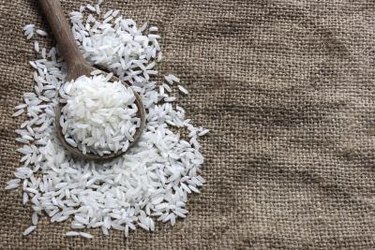
Soft, sticky and excellent for soaking up savory sauces, white rice makes a delicious accompaniment to many different meals. If you think white rice is doing much for your health, however, think again. Although white rice can be eaten as part of a healthy diet, there are much better sources of complex carbohydrates.
Processing
Video of the Day
To refine brown rice into white rice, a process known as polishing, producers remove the grain's outer shell, called the bran, as well as the grain's nutrient storehouse, called the germ. All that remains is the endosperm, the starchy part of the grain that is nearly devoid of nutrients other than carbohydrates. After refining, most white rice is enriched to add back in vital nutrients like iron and folic acid.
Video of the Day
Missing Nutrients
Because it lacks the bran and the germ, white rice is largely devoid of fiber, and deficient in the essential fatty acids, minerals and vitamins found in brown rice. Although some of these nutrients are added to enriched white rice, it's preferable to receive nutrients from natural foods, rather than enriched ones, whenever possible. Enriching rice also does not compensate for the lack of fiber. Fiber has numerous health benefits such as promoting digestive health, lowering cholesterol levels, stabilizing blood sugar and contributing to a feeling of fullness after eating. Although it's unclear what precise nutrient deficiency is to blame, there is also evidence that eating less white rice and more brown rice impacts your risk of diabetes. In a 2010 study, researchers from the Harvard School of Public Health found that eating at least five servings of white rice per week corresponded with an increased risk of Type 2 diabetes, while eating at least two servings of brown rice per week corresponded to a lower risk.
Alternatives
Experiment with alternatives for white rice. Many recipes are flexible enough that you can simply substitute brown rice for white rice, although check cooking times in advance as they may vary from what you're used to. To mix it up a bit, also try substituting other whole grains, such as quinoa, millet, bulgur or wild rice. If you've been eating white rice as a way to get more complex carbohydrates into your diet, consider other, better food sources like beans, lentils and potatoes. These are all superior sources of complex carbohydrates, as they are unrefined foods.
White Rice’s Place in Your Diet
If you love white rice there's no need to give it up entirely. However, make sure that your white rice consumption is only one component of a larger balanced diet. White rice and other refined grains like white flour should comprise no more than half of your daily grain intake. Since white rice lacks many beneficial nutrients, you should also rethink your consumption if eating white rice interferes with your desire or ability to include plenty of other, more nutrient-dense foods like vegetables, fruits, beans or dairy products in your diet.
- MedlinePlus; Carbohydrates; June 2011
- Centers for Disease Control; Carbohydrates; February 2011
- American Diabetes Association: Carbohydrates
- Harvard School of Public Health; Replacing White Rice with Brown Rice or Other Whole Grains May Reduce Diabetes Risk; June 2010
- U.S. Department of Health and Human Services; National Nutrition Month; March 2009
- Whole Grains Council: Rice and Wild Rice September Grains of the Month